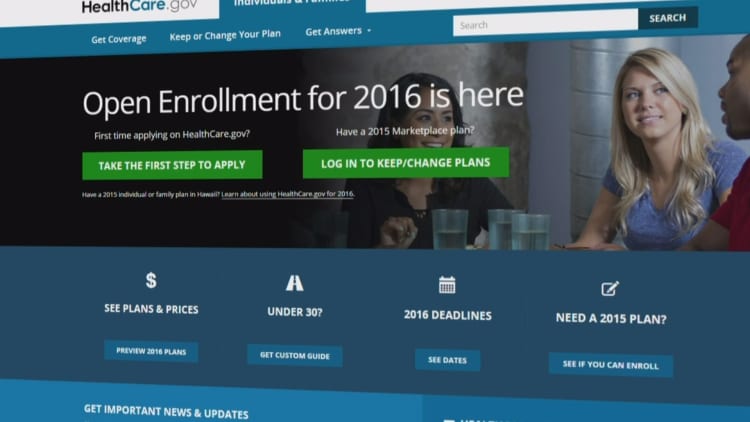
Obamacare was hit with a potentially damaging blow Thursday.
A federal judge has ruled that the Obama administration isn't authorized to reimburse insurers on Obamacare marketplaces for billions of dollars worth of subsidies given to millions of health plan customers to help pay their out-of-pocket medical costs.
The ruling, if ultimately upheld, threatens to destabilize the market for individual health insurance plans, according to a leading Obamacare expert.
Judge Rosemary Collyer's ruling, which she immediately stayed pending an expected appeal by the administration, came in response to a lawsuit filed by the Republican-controlled House of Representatives against the administration for spending that money without congressional authorization.
At stake is more than $150 billion expected to be paid to insurers over the next decade.
If Collyer's ruling in House v. Burwell is ultimately upheld by a higher court, it would mean that many customers of Obamacare exchanges would continue receiving subsidies from insurers to lower their out-of-pocket health costs — but leave the insurers without any reimbursement from the federal government.
That, in turn, could lead some insurers to either exit the Obamacare marketplaces, or to raise their premium prices significantly to compensate for their loss of expected money.
"This ruling could eventually increase health-care costs for as many as 7 million people with low and moderate incomes," tweeted Sara Collins, vice president for health-care coverage and access at the Commonwealth Fund.
"Ultimately, this could destabilize the marketplace resulting in higher premiums for everyone," Collins wrote.
More than half of the nearly 13 million customers on Obamacare exchanges currently receive the so-called cost-sharing reduction assistance as part of their health plans.
The assistance with copayments, deductibles and coinsurance charges is available to those customers whose household incomes are between 100 and 250 percent of the federal poverty level. Some of those customers would likely not sign up for Obamacare plans if they did not have cost-sharing assistance, which can greatly reduce their out-of-pocket co-medical costs, and, in some cases, eliminate them altogether.
The administration has argued, unsuccessfully, to Collyer that even if the payments the government has been making to insurers were not separately authorized by Congress, they are effectively authorized by the Affordable Care Act itself.
Collyer wrote that the administration's argument that the ACA obviously authorized the payments is "a most curious and convoluted argument whose mother was obviously necessity."
In her opinion, the judge noted that a major Supreme Court ruling in 2015, which had upheld the legality of other Obamacare subsidies, premium tax credits, awarded to enrollees of the federal health exchange, had said, "If the statutory language is plain, we must enforce it according to its terms."
Collyer then wrote: "The Affordable Care Act unambiguously appropriates money for Section 1401 premium tax credits but not for Section 1402 reimbursements to insurers. Such an appropriation cannot be inferred."
Read the major Obamacare ruling here.
"None of Secretaries' extra-textual arguments — whether based on economics, 'unintended' results, or legislative history — is persuasive," Collyer wrote, referring to claims made by the secretaries of the Department of Health and Human Services, and of the Treasury.
"The Court will enter judgment in favor of the House of Representatives and enjoin the use of unappropriated monies to fund reimbursements due to insurers under Section 1402. The Court will stay its injunction, however, pending appeal by either or both parties."
In response to the ruling, Marilyn Tavenner, a former top federal health official who now leads AHIP, the largest health insurance lobbying group in the nation, said, "There is a long judicial process ahead before a final decision is made."
"Our members' focus is and will remain on serving consumers — to ensure their coverage is protected and their health-care choices are maintained," Tavenner said.
White House press secretary Josh Earnest predicted Republican opponents would not prevail on appeal. "They've been losing this fight for six years, and they will lose again," Earnest said.
But Rep. Fred Upton, the Republican chairman of the House Energy and Commerce Committee, said, "Today is a victory for the rule of law and the American taxpayer."
"We received vindication of what we have known for quite some time — that the administration does not have the authority to spend over $150 billion for payments to insurance companies without an appropriation from Congress," said Upton. "Today, the court's message was clear: complying with Article I of the Constitution is not optional for President Obama."




